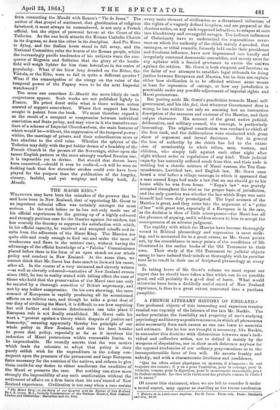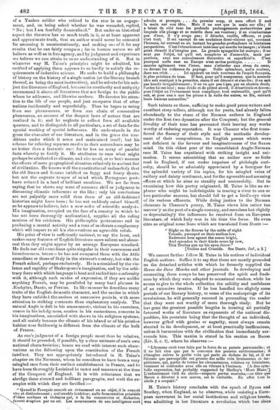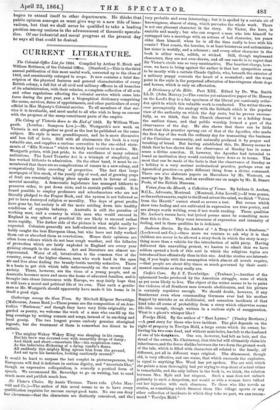A FRENCH LITERARY HISTORY OF ENGLAND.* THE professed objects of
this interesting and sagacious treatise remind one cogently of the labours of the late Mr. Buckle. The author proclaims the feasibility and propriety of one's studying psychology and historyaspositive sciences, in which all phenomena arise necessarily from such causes as one can learn to ascertain and estimate. But he has not thought it necessary, like Buckle, to encumber this doctrine with distinctions between man's indi- vidual and collective action, nor to defend it mainly by the weapons of disputation, nor to show much deference anyhow for the opposed tendencies of our ordinary prepossessions as to the incomprehensible force of free will. He asserts frankly and nakedly, and with a characteristic liveliness and confidence,
" Que les Oats soient physiques on moraux, it n'importe ; ils out toujours des causes ; it y en a pour l'ambition, pear le courage, pour la veracite, comme pour la digestion, pour le mouvement musculaire, pour la chaleur animate. Le vice et la vertu sent des produits comma le vitrio 1 at le snore."
Of course this statement, when we are left to consider it under a moral aspect, may appear as startling as the recent confession
* Histoire de is Litterature Anglaise. Par H. Taine. Three vols. Paris : Hachette...".././ and Cie., 18 68.
of a Yankee soldier who retired to the rear in an engage- ment, and, on being asked whether he was wounded, replied, " No ; but I am fearfully demoralized." But under an historical aspect the theorem has so much truth in it, or at least apparent and approximate truth, that an author would never be censured
for assuming it unostentatiously, and making use of it for any results that he can fairly compass ; for in human nature we all
believe as well as in free agency, and by judgment and experience we believe we can attain to some understanding of it. But in
whatever way M. Taine's principles might be admitted, his method of applying them appears to us hardly to satisfy the re- quirements of inductive science. He seeks to build a philosophy of history on the history of a single nation (or the literary branch thereof, as being the most instructive), and he selects for his sub-
ject the literature of England, because its continuity and antiquity recommend it above all literatures that are foreign to the public whom he addresses, and likewise modern. He devotes his atten- tion to the life of one people, and just compares that of other nations incidentally and superficially. Thus he hopes to wring fretn one phenomenon, or from one chain of consecutive phenomena, an account of the deepest laws of nature that are realized in it; and he neglects to collect from all available quarters, and to distinguish in all particulars, a set of data for the special working of special influences. He understands in the gross the character of our literature, and in the gross the con- ditions under which it arose and maintained itself; but his scheme for referring separate results to their antecedents may be no better than a fantastic one: for he has no array of parallel facts whereby to fortify it. He attributes to race what might
perhaps be attributed to climate, and vice versa, or to both sources the effects of mere geographical situation relatively to ancient foci of civilization. He knows well the constitutional melancholy that
the old Danes and Saxons imbibed on foggy and frosty shores, but not the cognate temper of mind which Portuguese poets have evinced in a land of brilliant sunshine. We are far• from saying that he shows any want of common skill or judgment in discussing climatic influences or the like ; only his conclusions are not palpably more solid than those of an old-fashioned historian might have been ; he has not suddenly raised himself, as he appears to believe, into a new order of scientific analysts. His imagination, occupied on the face of a country in which he has not been thoroughly acclimatized, supplies all the ruling motives of his criticism. His philosophic pretensions end in producing a mental activity and a tone of moderate complacency which will impart to all his observations an agreeable relish. His point of view is sufficiently national, to say the least, and makes many features of English literature more salient and abnor- mal than they might appear by an average European standard. He finds our old comedians quite singular in their coarseness and licentiousness, becau to he has not compared them with the Attic comedians or those of Italy in the sixteenth century, but with the French school, perhaps exclusively. He is astonished by the vio- lence and rapidity of Shakespeare's imagination, and by the arbi- trary force with which language is bent and racked into conformity with it, although such modes of expression, if they are unlike anything French, may be paralleled by many hard phrases in sEschylus, Dante, or Persius. In like manner he describes many traits of the English domestic character, and the modes in which they have unfolded themselves at successive periods, with more attention to striking contrasts than explanatory analysis. The natural Angle is dull in his amusements, violent in his exercises, coarse in his indulgences, sombre in his earnestness, concrete in his imaginations, unsatisfied with shows in his religious systems, and all mainly because the climate of his island or of his pristine habitat near Schleswig is different from the climate of the bulk of France.
As one's judgment of a foreign people must thus be relative, it should be preceded, if possible, by a clear estimate of one's own national characteristics ; hence we read with interest such obser- vations as the following upon the constitution of the French intellect. They are appropriately introduced in M. Taine's chapter on the Normans, whom he considers to have been a very mingled race from their earliest establishment in France, and to have been thoroughly Latinized in tastes and manners at the time of the Conquest of England. It is with reluctance that we abridge these shrewd and brilliant paragraphs, and omit the ex- amples with which they are fortified :—
" Quand Is Francais conceit un evenement ou un objet, it le conceit vite et distinctement ; nul trouble iuterieur, nulls fermentation prealable criddes confuses at violentes qui, It la fin concentrees et &ebonies, ,sent Eruption par an cri. Les mouvements de son inteliigence sont adroits et prompts. . . . du premier coup, et sans effort it met la main sus son bide. Mais it ne met qua la main ear elle; it a laisse de et:46 tons les profonds prolongementa enchevetrdes par lesquels she plonge et se ramifie dane sea voisines; it ne s'embarrasse pas d'eux, it n'y songs pas; it detache, cueille, effteure, et puis c'est tout. Il eat exempt de ces soudaines demi-visions qui, secouant l'homme, lui onvrent en un instant lee grandes profondenra at lointaines perspectives. C'est l'dbranlement interieur qui suscite lea images ; n'etant point ebranle it n'imagine pas. La grande sympathie lui manque ; ii ne sent pas l'objet, tel qu'il eat, complexe et d'ensemble, tugs par
portions, avec, une connaissance discursive et superficielle. C'est pourquoi nulls race en Europe east moans podtique. . . Bi
=trellis agilement vers l'issue, sans s'attarder aux 'tires du cceur, on devant lee richeases du paysage. Nulle splendour, nulle couleur, dans son recit. . . . Ici apparatt un trait nouveau de Pesprit &wigste, le plus precieux de tons. Il faut, pour qu'il comprenne, quo is seconde idee soft contigue b. la premiere, sinon it est &route et s'ariete; it ne salt pas bondir irrdgulierement ; ii ne va quo pas a pas, par un chemin droit; l'ordre lui est innd ; sans etude at de prime sherd, it desarticule at decom- pose l'objet ou Pevenement tout compliqud, tout embrouille, quel soit, et pose une Is nue lee pieces is Is suite des entree, en file, suivant leurs liaisons naturellea."
Such talents as these, sufficing to make good prose writers and excellent story-tellers, although not for poets, had already fallen abundantly to the share of the Norman authors in England under• the first two dynasties after the Conquest; but the genet-al frivolity of their tone has prevented their leaving any works worthy of enduring reputation. It was Chaucer who first trans- ferred the fluency of their style and the methodic develop- ment of their compositions, to English poems which were not deficient in the fervour and imaginativeness of the Saxon mind. On this eldest poet of the consolidated Anglo-Norman race M. Taine has expatiated with striking insight and ani- mation. It seems astonishing that an author now so little read in England, if not under impulses of philologic curi- osity, should be so admirably appreciated by a foreigner for the splendid variety of his topics, for his mingled veins, of" raillery and dainty sentiment, and forthe agreeableand amusing effects at which he aims so steadily and successfully. But in examining how this poetry originated, M. Taine is like an ex- plorer who might be indefatigable in tracing a river to one or two particular sources, but should fail to get a bird's-eye view of its various affluents. While doing justice to the Norman elements in Chaucer's poetry, M. Table views him rather too narrow'y as the poet of a single coun try, and mentions but slightly or depreciatingly the influences he received from an European literature, of which Italy was in his time the focus. He even cites as original some lines which are translated from Dante :—
" Right as the floures by the colds of night
Yclosde, ystouped on their stalkes low, Redressen hem agenet the sonne bright, And spreaden in their kinde tours by row, This Troilus gun up his eyen throw."
[Troilus and Cressida. See Dante, Inf., a 2.] We cannot further fellow M. Taine in his notices of individual English authors. Suffice it to say that these are mostly grounded on the detached articles with which he formerly supplied the Revue des Deux Mondes and other journals. In developing and connecting these essays he has preserved the spirit and fresh- ness by which they were adapted to occasional readers, while he seems to give to the whole collection the solidity and usefulness. of an extensive treatise. If he has handled too slightly some periods of our literary history, or some of the mainsprings of its revolutions, he will generally succeed in persuading the reader that they were not worthy of more thorough study. But be has gone the greatest possible lengths in treating all partially favoured works of literature as exponents of the national dis- position, his postulate being that the thought of an individual, however gifted with genius or sagacity, must always remain stunted in its development, or at least practically inefficacious, unless it harmonizes with the civilization that immediately sur- rounds him. This maxim is stated in his section on Bacon (Liv. ii, c. 3), where he observes :— "L'homme croit tont faire par is force de sa pensee personnelle ; et it ne fait rien qua par le contours des pensees environnantes ; it s'imagine snivre Is petite voix qui perle an dedans de 1W, et it ne l'de.onte quo parcequ'elle est grossie des mile voix braissantes et im- perieuses, qui, partie de toutes lee circonstanees, voisines on lointaines, viennent se confondre avec elle en vibrant Is l'unisson. [A fine sym- bolic expression, but probably suggested by Shelley's 'Mont Blanc.']. L'enfantement viril du siecle—temporis partus masculus,—ce titre pee Bacon a decerne Is son oeuvre, est le veritable. En effet taut is siècle y a cooperd."
M. Taine's history concludes with the epoch of Byron and Southey, when England, as he observes, while resisting a Euro- pean movement in her social institutions and religious tenets, was admitting in her literature a revolution which has since
begun to extend itself to other departments. He thinks that public opinion amongst us must give way to a new tide of inno- vations, but that we shall never be qualified to take a leading position among nations in the advancement of theoretic specula- tion. Of our industrial and moral progress at the present day he says all that could be desired.
































 Previous page
Previous page